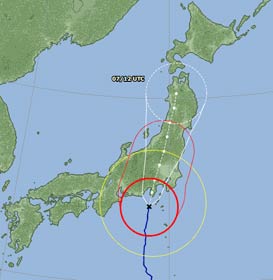September is storm season in Japan, as we were reminded when Typhoon Fitow — designated boringly as Typhoon No. 9 here in Japan — gave the country a good pummeling yesterday. While the majority of typhoons tend to threaten the southern islands like Okinawa and Kyushu, this strong storm landed smack in the Kanto area, bringing buckets of rain and winds of up to 108 kph/67 mph right into Tokyo and moving up the main Japanese island of Honshu. Throughout the country, flights were cancelled, Shinkansen stopped running, and even several subway lines had to be closed down due to strong winds, which stranded thousands. Our house shook like a continual earthquake, but aside from downed branches and scattered debris, there was no major damage.

In a monocultural place like Japan, the idea of “standing out” is viewed a little differently than how it would be in America or Europe, and living as a foreigner here means being at peace with sticking out a bit. As a general rule, whenever I go to the movies, head to the public bath or participate in some activity with my daughter’s Girl Scout Troop, I’m likely to be the only foreigner around, and that means I’ll often be getting more than my share of attention. This will take the form of a general awareness of my being there, so I go out of my way to use polite Japanese in public to make a good impression, and I make sure my kids use polite Japanese too, or speak English. There are times my unique status in Japan can work to my advantage, since most people who meet me once will remember my name, as I’m the only foreigner they’ve talked with all year, or perhaps in many years. While adults are polite about not staring, children often don’t know better, and I’ve had gaijin friends who really couldn’t handle having kids watching them all the time. (I find its better to strike up a conversation with the kids in Japanese to reassure them that I’m not from Mars.) It’s not like there are so few foreigners in our city that Japanese people are shocked when they see one; rather, it’s that the bulk of the gaijin population here, which are from countries like Brazil and Peru and Pakistan, don’t cross into straight “Japanese” territory as much as I do, and hence I find myself in situations where there are no other foreigners around me more often than not.
When you study Japanese, you have to learn more than just grammar, vocabulary and the writing systems — you need to get used to the subtlety of the language, of what is said directly and what is simply assumed. This can sound impossibly hard at first, but with practice and experience students can pick it up. One word that describes the famous vagueness of Japanese is nantonaku, which can be translated as “by feeling” “for some reason” or “without thinking about it.” Often, comprehending Japanese is a mixture of considering what is said and what is silently understood, for example, picking up the subject of a sentence even though it’s omitted. I found the best way to expose myself to the vagueness of spoken Japanese was to read lots of manga, which gave me a constant source of input of spoken language, since manga is almost entirely dialogue. If you want to surprise a Japanese person, memorize this word. If they ask you why you know something they don’t expect foreigners to know, just answer “Nantonaku.” (“Don’t ask me, I just know.”)
Remember, you can now get your very own custom-made kanji name stamp from J-List, with our Custom Hanko Service. Choose one of three Japanese name stamps and let us know what kanji characters or message you’d like printed on the stamp, and the J-List staff will work with you to come up with the best kanji for you, then make your stamp. Stamps can be made using hiragana, katakana, kanji, or even the Roman alphabet.















